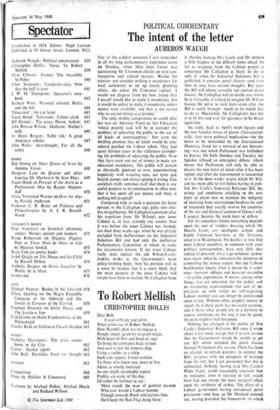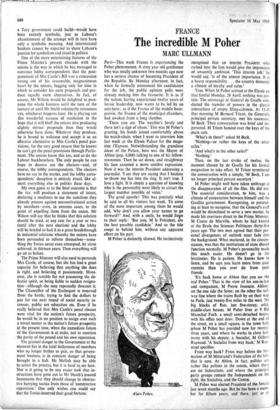The intent of the letter
POLITICAL COMMENTARY AUBERON WAUGII
One of the saddest moments I can remember in all my long parliamentary experience came on Monday, when Miss Joan Lestor was questioning Mr Crossman closely on oral con- traception and related matters. Would the minister not consider making it mandatory for local authorities to set up family planning clinics, she asked. Mr Crossman replied : I would not disguise from my hon. friend that I myself would like to make it mandatory, but it would be unfair to make it mandatory unless money were available, and that is the reason why we are not doing so at present.'
The only shabby compromise he could offer her was an Advisory Panel on Sex Education `whose priority task will be to consider the problem of educating the public in the use of all kinds of contraceptives.' Not even the thrilling promise that all kinds would be con- sidered pacified the Labour rebels. They had spent thirteen years in the wilderness consider- ing the problems of educating the public. Ncw they have even run out of money to make sex education mandatory. The public will remain as abysmally ignorant as ever, experimenting hopelessly with watering cans, car tyresqnd bicycle pumps and always getting it wrong. Can socialism really convince itself that there is any useful purpose to its continuation in office now that it has spent all our money and there is nothing left to spend?
Compared with so stark a question the latest episode in the Callaghan saga pales into rela- tive insignificance. Mr Callaghan's position after his expulsion from Mr Wilson's new inner Cabinet is, in fact, scarcely any weaker than it was before the inner Cabinet was formed, less than three weeks ago, when he was already excluded from deliberations on the Industrial Relations Bill and had only the ineffective Parliamentary Committee in which to make his importance known. If the inner Cabinet really does replace the old Wilson-Castle- Jenkins troika as the Government's main policy-forming body, then his position will in a sense be weaker, but it is more likely that the main purpose of the inner Cabinet will simply have been to exclude Mr Callaghan from it, thereby making Mrs Castle and Mr Jenkins a little happier in the difficult times ahead. So far as resigning from the Cabinet proper is concerned Mr Callaghan is likely to do so only if, when the Industrial Relations Bill is published, it contains penal clauses—and even then he may have second thoughts. But since the Bill will almost certainly not contain penal clauses, Mr Callaghan will no doubt stay where he is. Certainly, it is hard to imagine Mr Wilson having the nerve to sack him—even after the Bill is safely through—much as he would like to do so. Meanwhile, Mr Callaghan's best bet is to lie low and wait for greatness to be thrust upon him.
So, sadly, back to April's trade figures and the now familiar noises of gloom. Characteristi- cally, their main political implication—for the terms to be demanded by the International Monetary Fund for a renewal of our borrow- ing—was one which Parliament was forbidden to discuss. On both Monday and Tuesday the Speaker refused an emergency debate, which means that Parliament will only be able to discuss the new letter of intent after it has been signed, and after the Government is committed to it In the three weeks' respite which Mr Wil- son has been able to win before having to pub- lish Mrs Castle's Industrial Relations Bill, the strings and conditions attaching to the new letter of intent (not to mention the indignity of receiving from international bankers the sort of treatment they usually reserve for countries of the size and financial acumen of Ghana) will, I suspect, become the main topic of debate.
For the immediate future, everything depends upon the sort of window dressing which Mr Harold Lever, our intelligent, urbane and kindly Financial Secretary at the Treasury, secural in Washington. No doubt i , in true that most Labour members, in common with your political correspondent, have very little idea indeed of precisely what a government spokes- man means when he announces his intention of controlling the money supply; but any Labour backbencher knows what is meant by a refer- ence— however oblique and however recondite —to public expenditure. It means, among other things, less sex education for the public and no mandatory contraception—the sort of de- privation up with which no self-respecting Labour member can any longer be constrained upon to put. Without other people's money to spend, the Labour party has no useful purpose, and if those other people are in a position to impose conditions on the way it can be spent, the party might as well disappear.
Nothing has changed in the matter of Mrs Castle's Industrial Relations Bill since I wrote about it last week, except that it is now certain that the Government would be unable to get any Bill which included the penal clauses through Parliament this session. There has been an attempt, in certain quarters, to connect the Bill's progress with the prospects of leniency from the IMF, but I am persuaded that this is unfounded. Nobody, having read Mrs Castle's White Paper, could reasonably conclude that its measures, even if enacted in full, would have had any except the most marginal effect upon the incidence of strikes. The effect of a Labour government having introduced penal provisions—and thus, as Mr Macleod pointed out, having provided the framework on which
a Tory government could build—would have been entirely symbolic, just as Labour's abandonment of the attempt will in turn have only a symbolic meaning. And international bankers cannot be expected to share Labour's passion for symbolism and ritual in politics.
One of the more entertaining features of the Prime Minister's present charade with the unions is the way in which he has managed to convince lobby correspondents that the post- ponement of Mrs Castle's Bill was a concession wrung out of his reasonable, magnanimous heart by the unions, begging only for time in which to consider his stern proposals and pro- duce equally stern alternatives. In fact, of course, Mr Wilson would be delighted to post- pone the whole business until the turn of the century or until Mr Smith voluntarily renounces UDI, whichever happens later. He is playing out this wonderful masque of resolution in the hope that it will bluff the unions into producing slightly sterner proposals than they would otherwise have done. Whatever they produce, he is bound to welcome and accept it as an effective alternative to Mrs Castle's penal pro- visions, for the very good reason that he knows he can't get the penal provisions through Parlia- ment. The unions know this too, and so do the Labour backbenchers. The only people he can hope to deceive are the electors—and, of course, the lobby correspondents. The electors have no say in the matter, and the lobby corre- spondents' deception is entirely ritual, like al- most everything else in politics these days.
My own guess as to the final outcome is that the TUC will produce a statement of intent, declaring a readiness to use the sanctions they already possess against unconstitutional action by members—even, in extreme cases, to the point of expelling them from the union. Mr Wilson will say that he thinks that this solution should be tried, at any rate for a year or two (until after the next election) and the lobby will be briefed to hail it as a great breakthrough in industrial relations whereby the unions have been persuaded to reform themselves—some- thing the Tories never even attempted, let alone achieved, in thirteen years. Then everything will go on as before.
The Prime Minister will also need to persuade Mrs Castle, of course, but she has had a great capacity for believing that anything she does is right, and believing it passionately. More- over, she is notable for not possessing the de- featist spirit, or being liable to sudden resigna- tion—although she may repeatedly threaten it. The Chancellor of the Exchequer is removed from the battle, trying to find the dollars to pay for our next round of social security in- creases, public sex education etc. Even if he really believed that Mrs Castle's penal clauses were vital for the nation's future prosperity, he would be in no position to resign over such a trivial matter as the nation's future prosperity at the present time, when the immediate future of the Government is at stake, not to mention the parity of the pound and his own reputation.
The greatest danger to the Government at the moment lies in the total listlessness of members who no longer bother to pair, so that govern- ment business is in constant danger of being brought to a halt. Mr Mellish may be able to arrest the process, but it is hard to, see how. Nor is it going to be any easier now that in- structions have gone out to Mr Heath's trusted lieutenants that they should change to obstruc- tive harrying tactics from those of 'constructive opposition.' One only wishes one could say that the Tories deserved their good fortune.







































 Previous page
Previous page